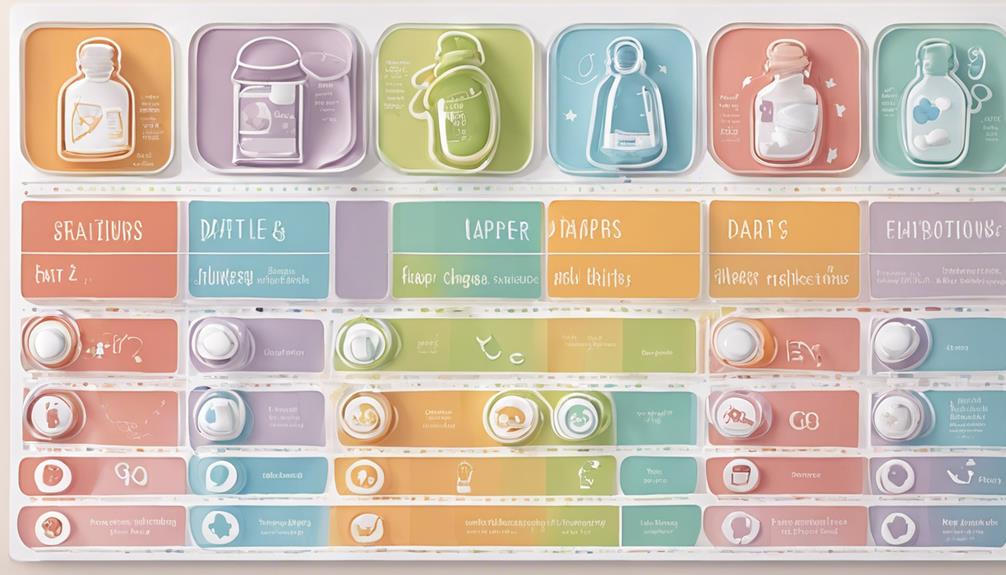In terms of newborn care, it’s crucial to have a carefully crafted and customized plan ready.
But have you ever wondered what exactly goes into crafting these top newborn care plans?
From establishing feeding routines to monitoring important developmental milestones, these care plans offer a roadmap to guarantee the health and wellness of your little one.
But what specific strategies and considerations are key to creating an effective care plan that meets your baby's unique needs?
Let's explore the intricacies of these essential care plans together.
Key Takeaways
- Tailored breastfeeding care plans ensure successful feeding and comfort for the newborn.
- Consistent baby hygiene routines promote cleanliness and growth.
- Monitoring developmental milestones aids in early intervention and healthy growth.
- Establishing a complete immunization plan safeguards the baby against serious diseases.

My Brest Friend Nursing Pillow – Deluxe – Enhanced Comfort w/ Slipcover – Ergonomic Breastfeeding Pillow For Ultimate Support For Mom & Baby – Adjustable Pillow W/ Handy Side Pocket, Soft Rose
ERGONOMIC DESIGN: Elevate your nursing journey with our unique nursing pillow. The wrap-around feature ensures ideal positioning &…
As an affiliate, we earn on qualifying purchases.
As an affiliate, we earn on qualifying purchases.
Breastfeeding Care Plan
In our approach to newborn care, we prioritize creating tailored breastfeeding care plans to guarantee successful initiation and maintenance for both the newborn and the mother. Nursing care plans for breastfeeding encompass a thorough assessment that includes evaluating latch quality, milk transfer efficiency, and the comfort of the mother during feeding sessions.
Our interventions focus on providing precise positioning guidance to optimize latch, recommending appropriate feeding frequencies, and offering unwavering support to overcome any breastfeeding challenges that may arise. Educational breastfeeding techniques are a cornerstone of our care plans, ensuring that mothers are equipped with the knowledge of breastfeeding benefits, proper latch methods, and indicators of successful feeding sessions.
Continuous monitoring of newborn weight gain, hydration levels, and breastfeeding patterns allows us to adapt and refine our care plans to meet the evolving needs of both the baby and the mother, fostering a nurturing and successful breastfeeding journey.
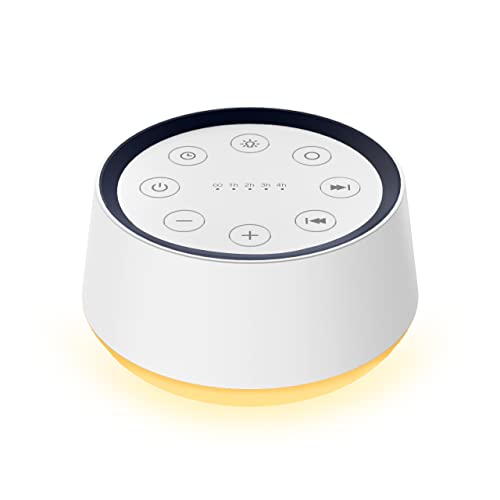
Brown Noise Sound Machine with 30 Soothing Sounds 12 Colors Night Light White Noise Machine for Adults Baby Kids Sleep Machines Memory Function 36 Volume Levels 5 Timers for Home Office Travel
❤[30 Natural and Soothing Sounds] Our white noise machine provides 30 soothing sounds, including 3 Brown noise, 2…
As an affiliate, we earn on qualifying purchases.
As an affiliate, we earn on qualifying purchases.
Newborn Sleep Schedule
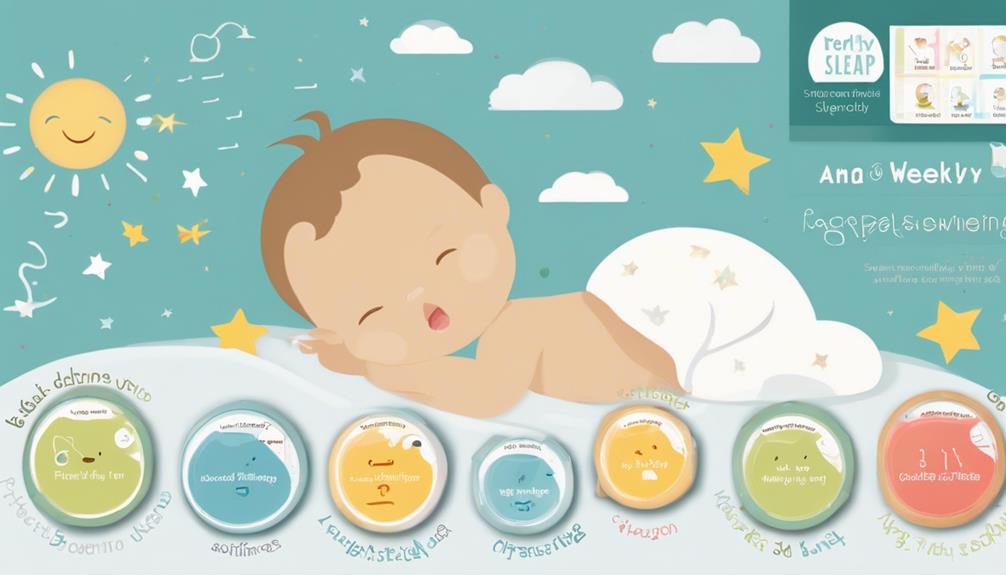
Creating a nurturing and conducive sleep environment is imperative for establishing a healthy newborn sleep schedule. Newborns have unique sleep patterns that require attention to detail and consistency in their sleep routine. Here are some essential points to take into account:
- Monitor Sleep Cues: Watch out for signs of tiredness like eye rubbing, yawning, or fussiness, as these cues indicate that your baby might need rest soon.
- Establish Routine Feedings: Newborns wake up every 2-3 hours for feeding, so make sure to incorporate these frequent nourishment sessions into their sleep schedule.
- Create a Calm Environment: Dim the lights, play soothing sounds, and maintain a peaceful atmosphere to help your baby relax and fall asleep easier.
- Recognize Signs of Tiredness: Being attentive to your baby's behavior can help you identify when they're getting sleepy and ready for sleep.
- Be Consistent: Stick to a regular sleep routine to help regulate your newborn's sleep patterns and promote better rest for both you and your baby.

Baby Healthcare and Grooming Kit for Newborn Kids, 24PCS Upgraded Safety Baby Care Kit, Newborn Nursery Health Care Set, Baby Care Product (Grey White)
【Baby Health Essentials Kit】24 in 1 baby grooming kit includes a baby hair brush and comb, baby nail…
As an affiliate, we earn on qualifying purchases.
As an affiliate, we earn on qualifying purchases.
Baby Hygiene Routine
Establishing a consistent and gentle baby hygiene routine is essential for safeguarding your little one's health and well-being. Proper skin care, regular diaper changes, and gentle bathing play vital roles in maintaining cleanliness and preventing infections.
When caring for your baby's delicate skin, opt for mild, baby-friendly products to avoid harsh chemicals that could cause irritation. Cleaning the umbilical cord stump with alcohol and ensuring it stays dry aids in the natural healing process.
By instilling good hygiene habits from the beginning, you're laying the foundation for your baby's lifelong health and well-being. Remember, every step you take in maintaining your baby's hygiene contributes to their overall wellness and happiness.
Prioritizing these routines not only keeps your baby clean and comfortable but also fosters a healthy environment for their growth and development.
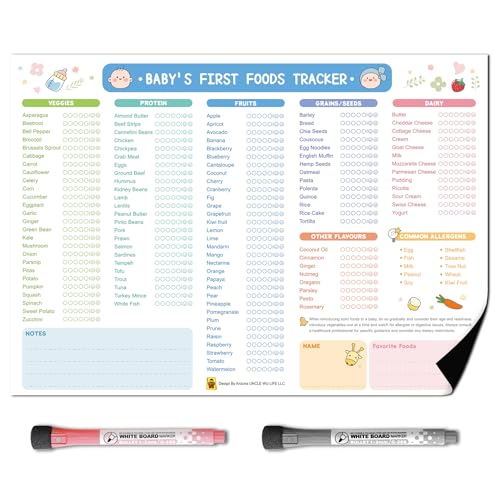
UNCLE WU First Foods Tracker Fridge Magnet – Dry Erase Daily Food Log and Activity Poster – Baby Food Chart/Checklist, Baby Feeding Essentials (10 x 14 inch)
BABY’S FIRST FOOD CHECKLIST: Track your baby’s food journey easily with our large fridge magnet. Plan meals and…
As an affiliate, we earn on qualifying purchases.
As an affiliate, we earn on qualifying purchases.
Developmental Milestones Tracking
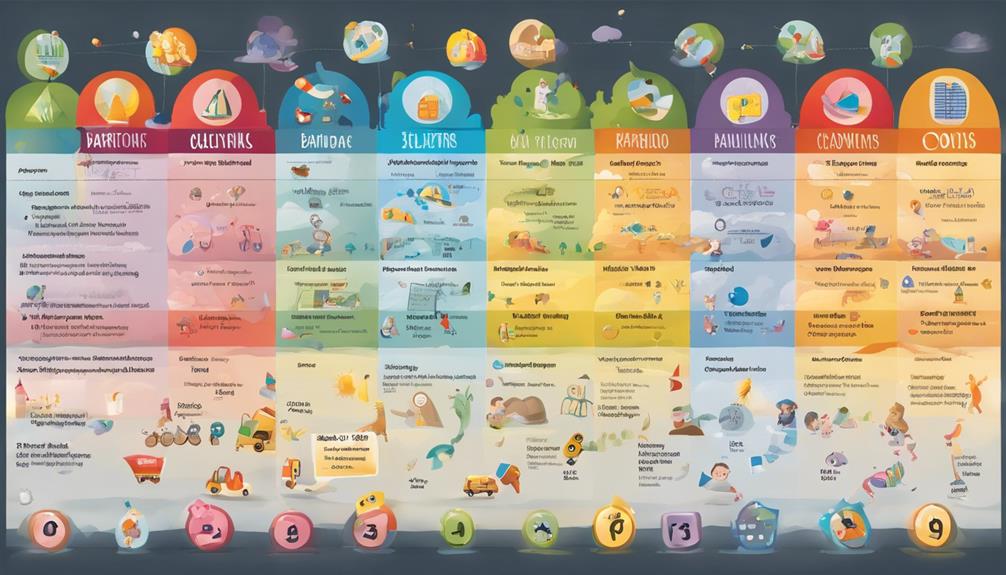
Monitoring your baby's developmental milestones is important for evaluating their progress in physical, cognitive, and social-emotional areas. Tracking these milestones allows us to observe their growth and development, making sure they're reaching key milestones within expected time frames.
Here are some key points to take into account when tracking your baby's developmental milestones:
- Developmental milestones encompass a range of activities like lifting their head, smiling, making eye contact, and grasping objects.
- Tracking these milestones helps identify any delays or concerns early on, allowing for timely intervention and support.
- It provides us with a guideline to make certain our baby is growing and developing at a healthy pace.
- Regular milestone tracking fosters a strong bond between parents and their child, enhancing our understanding of the baby's abilities and growth.
- If any concerns arise regarding our baby's progress, seeking professional advice can be beneficial in addressing any potential delays or challenges.
Baby Immunization Plan
When considering the well-being and development of your newborn, one important aspect that demands attention is establishing a complete baby immunization plan. Baby immunizations are essential for safeguarding newborns against potentially serious diseases and infections. Following the recommended vaccination schedule not only helps build immunity in your baby but also plays a significant role in preventing the spread of diseases within the community.
Newborns can start receiving immunizations as early as the first few days of life, with vaccines like hepatitis B, rotavirus, DTaP, and others being commonly administered. These childhood immunizations, including Hib, pneumococcal, polio, and influenza vaccines, are essential for providing thorough vaccine protection.
To make sure your baby receives the necessary immunizations on time, it's important to discuss the baby immunization plan with healthcare providers. This collaboration helps in fostering vaccination adherence and guarantees that your newborn is shielded against preventable diseases right from the start.
Frequently Asked Questions
What Are the Most Important Ways to Care for Your Newborn Infant Care?
We prioritize consistency in feeding schedules, understanding sleep patterns, maintaining hygiene, and celebrating milestones for our newborn's well-being. Tailoring care to their unique needs is vital. Our approach guarantees their growth, health, and development.
What Are the Basic Care Needs of a Newborn Baby?
We focus on the basic care needs of a newborn baby. We guarantee frequent feedings every 2-3 hours, maintain cleanliness for diaper changes, prioritize proper hygiene, monitor sleep patterns and developmental milestones, and create a nurturing environment for bonding and growth.
What Is the Highest Priority in Newborn Care?
Ensuring newborn stability by maintaining life signs is our top priority. We focus on facilitating a smooth fetal-to-neonatal change, optimizing respiratory function, monitoring cardiovascular adaptation, and regulating body temperature for the health of our little ones.
What Are the Three Goals of Newborn Care?
Ensuring newborn stability, facilitating fetal-to-neonatal change, and promoting best respiratory function are the three key goals of newborn care. By addressing these goals, we can help newborns thrive and adjust effectively to their new environment.
Conclusion
In summary, implementing a thorough newborn care plan is essential for ensuring the health and well-being of your baby.
Did you know that by following a consistent sleep schedule, newborns can sleep up to 16-17 hours a day during their first few weeks of life?
This statistic highlights the importance of creating a nurturing and structured environment for your little one to thrive.
Stay informed, stay proactive, and watch your baby grow and flourish.
